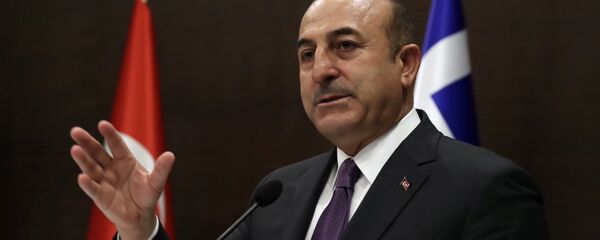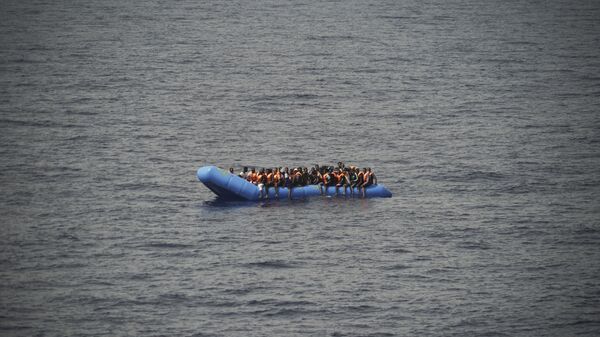Sputnik has spoken about the refugee crisis issue with Jan Egeland, Secretary-General of the Norwegian Refugee Council, and former UN Special Adviser on Syria.
Sputnik: You’ve come to Moscow to discuss the humanitarian situation with the Kremlin, particularly in Libya. What are the results of the meeting and what could Russia's role in the region be?
Jan Egeland: We've had meetings now with the Ministry of Foreign Affairs, various departments in the Ministry of Foreign Affairs and with EMERCOM. Of course, we're here because we are a large international humanitarian organisation working in nearly all conflict areas around the world for the civilian population and for refugees and displaced.
In many of these countries where we operate Russia is very influential and has influence. It has relations with the government. It is supporting the government, could even be militarily active. So the four countries we brought up were Syria, Venezuela, and Ukraine - Eastern Ukraine - and Libya. And we also brought up the issue of the protection of civilians in general in conflicts and how we can make sure that humanitarian and medical sites are always protected from attack.
It is very important that everybody, including Russia, do their utmost to make sure they're always protected from possible attacks. And the meetings were very constructive, frank, open, and good. We discussed all of the countries and all of the issues that we had that we wanted to bring up. I also said we in some of these countries already have exchanges, productive exchanges with Russian diplomats. And I asked that we have even more contact in the future since Russia will remain very important in these and other counties.
Sputnik: Recently we saw an escalation of the conflict in Libya with the subsequent Berlin conference where countries agreed to the ceasefire. How will this impact the migrant flows to Libya itself, and to Europe, especially in the event of a further escalation of the conflict and violations of the ceasefire? Can we expect a new migration crisis?
Jan Egeland: We hope not. We hope that the Moscow and Berlin meetings can contribute to a ceasefire and peace talks that can bring permanent peace to Libya. NRC, my organisation, we are active in both - we have a humanitarian branches both in the Tripoli area and in the Benghazi area, so well on both sides of the conflict lines. And we have seen how the situation has deteriorated for the civilian population, the terrible cost of the fighting.
We can and must scale up our operations. But we recognise as a humanitarian organisation that Libya as well as in Syria and in all of these other countries that what the population needs even more than existence is an end to the migrants. So, that's why we are urging the parties to the conflict to stop fighting and we are urging Russia and other countries with influence to do more to push these parties to make peace and - as was agreed - to avoid external actors adding fuel to the fire.
Sputnik: What else should European countries do to tackle the migrant flows from Libya, which have particularly affected Italy?
Jan Egeland: In Libya now there are many groups suffering from the conflict. The general civilian population that find themselves in the crossfire. And the internally displaced who have been displaced by the fighting. And then you have the migrants and refugees who come from other parts of Africa and who are now trapped inside Libya and who are often in terrible conditions.
So certainly the aim of the migrants is not, for most of the migrants, is not Libya. They wanted to go to Europe and those who are fleeing from conflict want to have protection in Europe. And some of the migrants want to get out of horrible poverty. They want to get jobs and opportunities in Europe. First, what Europe should is make sure that Libya and the Libyan parties do not detain migrants. It's not a criminal thing to be a migrant.
And many of them are now in detention centres and they are suffering terribly. They are completely stuck there. And what we urge is an opportunity for people who are fleeing from persecution to seek asylum in Europe. Everyone should have the right to seek asylum. If you're individually persecuted, you should get refugee status.
Secondly, we urge that those who are trying to go across the Mediterranean be saved and ships should also be saved. It is terrible that there are few efforts now to save people who are actually drowning in the Mediterranean on their way to safety in Europe, those who reach Europe should be assessed, screened if they are genuine refugees. They should not have a right to settle in Europe if they are not genuine refugees. They have no right to immigrate. They can apply for immigration status if they're not. Of course, they can then be rejected.
So how should people then receive asylum in Europe? It should be a European responsibility-sharing effort so that those who are in Greece and in Italy can be distributed in most European countries and not just in a few European countries, it should be a common European responsibility. There are already a few countries like Germany, France, and Spain who said they will distribute migrants; they will receive those who have come to Italy and seek asylum. So a few countries have said we will help Italy in receiving people.
It's not many. Lebanon alone has taken more refugees than in Europe in recent years. There is more than a million Syrians in Lebanon. That is more than the number of Syrians in Europe. Europe should be able to receive and share the responsibility for those who come, who have the right to asylum. Those who have no right to asylum - if I come as if just seeking a better economic life, I can be turned back. Because I'm not a refugee.
What we should also recognise is that Turkey is the most generous recipient. It's the largest host of refugees of any country in the world. We need to recognise that what we are urging Turkey to do is to not send anyone back against their will to Syria or elsewhere. And of course, we're urging Turkey and Europe to reopen talks because we do not like the agreement whereby those who come to Turkey cannot go on to Europe and Europe has said to Turkey, send no one on to us. It should also be possible to go to seek asylum. That we have a right to decide. It's a very heated debate in Europe between those who will want to reject everybody coming and those who say welcome to refugees, but also in Italy are two very different views.
We hope for less polarisation and this should not be a political issue – it’s a human rights issue as such. And then as regards Libya, no one should be sent back to Libya where it's very unsafe. No one should end up in a crossfire and no one should be detained and under terrible conditions in Libya. We really, really need now for an end to the war in Libya. We need better conditions for humanitarian work there, and we need a larger humanitarian programme in Libya and in all parts of the country.
And my organisation is willing and able to help in doing that. The place on earth where there is the greatest number of civilians now in harm's way, in danger is in Idlib, in Syria. They are in a region with militant Islamist groups. What we urge, and that's part of our message here is that there cannot be an attack, a pure military attack which is filled to the brim with civilians, of the three million people, more than half are already displaced inside Idlib. So we urge talks even with the militant groups that there is a ceasefire and that we try to avoid, to prevent all fighting in what is in many ways a gigantic refugee camp.
I'm very worried for these civilians in Idlib and it very much is at stake. Those who have influence there, in addition to the Syrian government, are Russia, Turkey, Iran, and to some extent Gulf countries like Qatar; on either side, on the Syrian government side or on the opposition groups. I would reject the idea that you cannot talk with the groups inside, even though they are reckless and ruthless, you can talk to them and I'll give you an example.
When I was in Geneva, I worked very well with Russian diplomats and military in a humanitarian task force from the United Nations. There have already been talks with many of the groups who are now in Idlib. So people were taken in buses from opposition-held areas and sent to Idlib in negotiated deals. So the reason there are many militants in Idlib is that they were sent on buses there from elsewhere as part of agreements. So, of course, we can talk with them.

I think those who are in neighbouring countries, they want to go back. Their future is not in Lebanon, really. It is predominantly in Syria. So that's also one of the issues being brought up here. Can we have better security guarantees, protection, and assistance for voluntary return? All returns have to be voluntary. The people themselves have to wish it, but we also need to enable that through assistance and protection.

